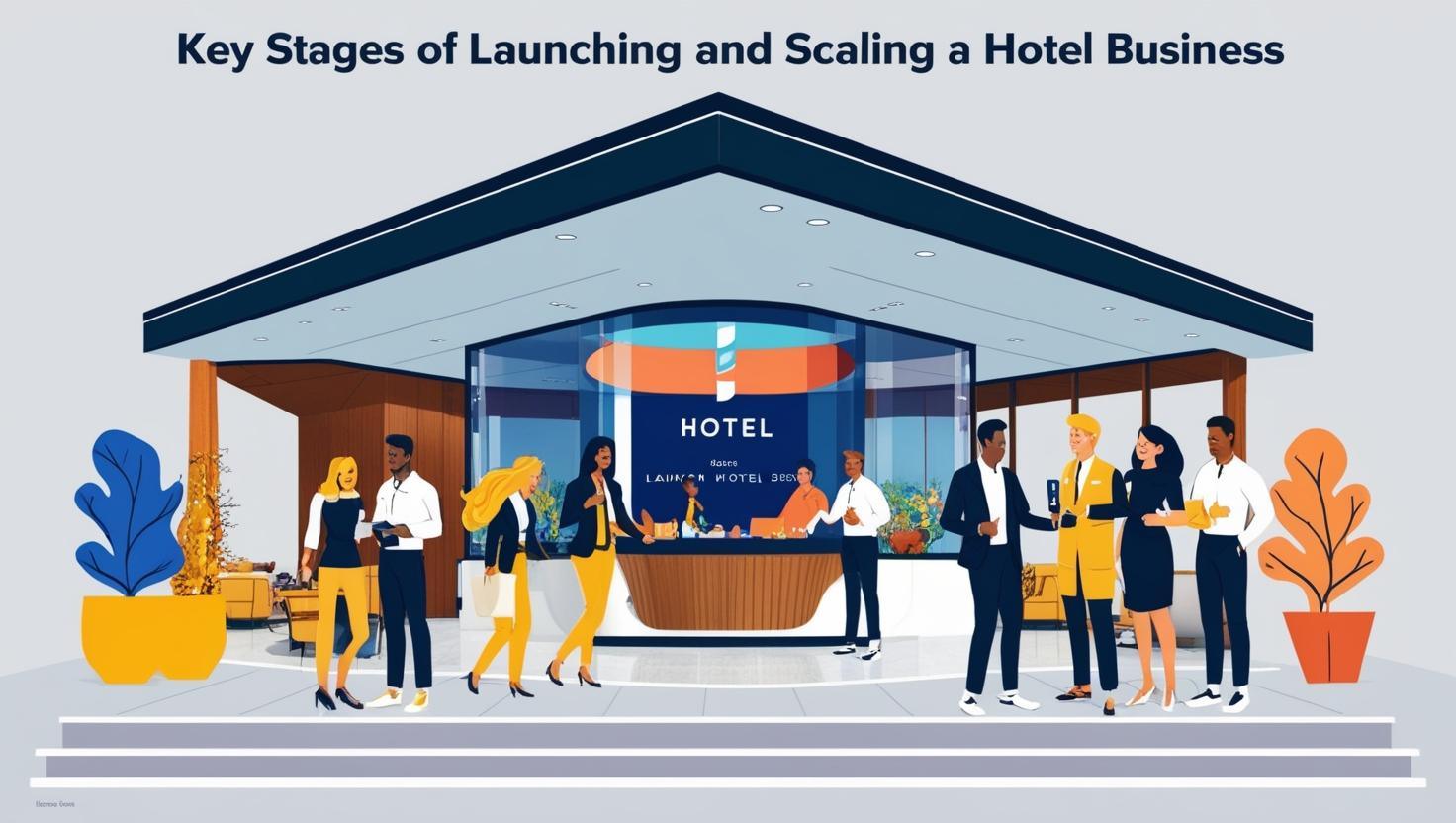Introduction
Building a hotel business from scratch can be an exciting yet challenging venture. Whether you’re a hospitality veteran or a first-time entrepreneur, understanding how to build a hotel business requires a combination of market knowledge, financial planning, operational strategy, and tech-savvy implementation.
In this in-depth guide, you’ll learn how to plan, launch, and scale a hotel business — while also exploring insights that can benefit you if you’re looking to start a restaurant, develop a SaaS app, or improve your UI/UX design and web development for better customer engagement.
1. Understand the Hotel Business Landscape

1.1 Types of Hotels to Consider
Before diving into construction or investment, define your hotel model:
-
Boutique Hotel: Unique design, personalized service.
-
Budget Hotel: Cost-effective, minimal amenities.
-
Luxury Hotel: Premium service, high-end clientele.
-
Resort Hotel: Vacation-focused, all-inclusive experiences.
-
Smart Hotel: Tech-driven, IoT-enabled rooms using SaaS apps.
Each model has distinct market requirements and startup costs.
1.2 Target Audience Analysis
Ask yourself:
-
Are you targeting business travelers, digital nomads, or tourists?
-
Is the location seasonal or consistent year-round?
-
Will your hotel cater to domestic or international visitors?
This information is crucial for shaping your marketing strategy and user experience design.
2. Market Research and Location Strategy

2.1 Competitive Analysis
Conduct a thorough SWOT analysis:
-
Strengths: Unique value proposition, location, or technology.
-
Weaknesses: High startup costs, limited experience.
-
Opportunities: Growing tourism, underserved locations.
-
Threats: Market saturation, economic downturns.
Also, research competitors in your area and analyze their pricing, services, and digital presence (especially their web design and booking systems).
2.2 Choosing the Right Location
Key factors include:
-
Proximity to tourist attractions, business hubs, or transport stations.
-
Safety, visibility, accessibility.
-
Zoning laws and permit regulations.
If you’re thinking about expanding into restaurants, choose a location that complements a How to Start a Restaurant strategy as well — e.g., hotel restaurants that also serve walk-in locals.
3. Crafting a Solid Business Plan
Your hotel business plan should cover:
-
Executive Summary
-
Market Analysis
-
Business Model (Franchise, Independent, or Management Contract)
-
Marketing Strategy
-
Financial Forecast
-
Technology Stack
Use tools like SaaS platforms for budgeting, forecasting, and automation.
4. Legal Structure and Licensing
4.1 Register Your Business
Choose a legal structure (LLC, corporation, partnership) based on liability and tax advantages.
4.2 Obtain Necessary Permits
-
Hotel construction and zoning permits
-
Fire safety, sanitation, and building inspection certifications
-
Business operation licenses
-
Food and beverage permits if you include a restaurant
Pro tip: If you plan to add an in-house restaurant, refer to best practices from How to Start a Restaurant — especially in terms of food safety compliance and staffing.
5. Designing Your Hotel: UI/UX Matters Offline & Online
5.1 Physical UI/UX Design
Think of your hotel as a product. Aesthetic appeal and user-centered design lead to higher retention. Focus on:
-
Seamless check-in/check-out processes
-
Logical room layouts
-
Inviting shared spaces like lobbies, lounges, and spas
-
Accessibility features
5.2 Digital UI/UX Design
In the digital age, your website is often the first impression.
Invest in:
-
Professional UI/UX design for your booking engine
-
Mobile-first, responsive layout
-
Fast-loading, secure experience
-
Chatbot for FAQs or booking assistance
6. Build a Strong Technology Backbone
6.1 Use SaaS App Development for Operations
Hotel management software (HMS) built on SaaS app development principles can help you manage:
-
Reservations
-
Room assignments
-
Housekeeping schedules
-
Customer relationship management (CRM)
-
Analytics and reporting
Top SaaS tools for hotels include:
-
Cloudbeds
-
eZee Absolute
-
RMS Cloud
Or, if you’re tech-savvy or working with a development team, consider custom SaaS app development to fully tailor operations.
6.2 Web Development for Online Presence
Your hotel website should:
-
Offer direct booking (to reduce commission fees from OTAs)
-
Integrate with payment gateways
-
Be optimized for SEO with keyword strategies like How to Build a Hotel Business
Use WordPress, Webflow, or go custom with React, Vue, or other frameworks depending on your budget and technical capabilities.
7. Staffing and Team Management

Hire for:
-
Front desk
-
Housekeeping
-
Kitchen and F&B (if applicable)
-
Maintenance
-
Digital marketing (or outsource)
Provide training in:
-
Hospitality standards
-
POS and SaaS tools
-
Guest relations and cultural sensitivity
8. Marketing and Branding Your Hotel

8.1 Build a Brand Identity
-
Name, logo, tagline
-
Visual identity aligned with your hotel theme (luxury, minimalist, family-friendly, etc.)
-
Voice and tone for digital communication
8.2 SEO & Content Strategy
Target keywords like:
-
“Best hotels in [city]”
-
“Affordable boutique hotels”
-
“Eco-friendly hotels in [region]”
-
And of course: How to Build a Hotel Business
Write blog posts about local attractions, travel tips, or even content for those who want to start a restaurant, encouraging cross-sector visits.
8.3 Social Media and Influencer Outreach
Platforms to focus on:
-
Instagram: Visual storytelling
-
TikTok: Behind-the-scenes and unique experiences
-
Google My Business: Reviews and local SEO
-
LinkedIn: For networking and B2B bookings
9. Launching and Scaling Your Hotel Business

9.1 Soft Launch and Feedback Collection
Do a trial run with friends, influencers, or loyal customers. Collect feedback on:
-
Cleanliness
-
Service speed
-
Booking process
-
UI/UX on digital platforms
9.2 Expansion Strategy
As your business grows, explore:
-
Adding a restaurant (using the guide: How to Start a Restaurant)
-
Developing a hotel app (custom SaaS app development)
-
Opening new branches
-
Franchising
Conclusion
Building a hotel business is no small feat — it demands a balance of hospitality, technology, and strategy. From choosing your hotel model to optimizing your UI/UX design, embracing SaaS technologies, and crafting an exceptional web presence, every step matters.
Whether you’re transitioning from another industry or you’re also exploring how to start a restaurant, the knowledge and approach you gain here can be applied across ventures.
With the right tools, team, and vision, your hotel can stand out and thrive — even in competitive markets.

